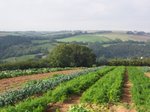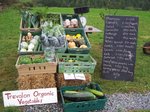Wednesday, 2 December 2009
Public meeting success
FIRST STEPS IN PLANNING THE FUTURE OF TREVALON FARM
On Tuesday 24th November 2009,50 people braved the winter storms to attended a Public Meeting at the Public Hall in Liskeard.
This was the first meeting aimed at involving the community in deciding the future of Trevalon Organic Farm near Herodsfoot.
The event began at 7pm, when people where invited view a display about Trevalon and discuss possibilities over a cup of organic fair-trade coffee or tea.
At 7.20pm the formal meeting began:
First there was an introduction by Klaudia Van-Gool who introduced the idea that we need to create local sustainable food systems in order to tackle the problem of peak oil and climate change.
This was followed by a presentation by Traci Lewis of the Soil Association, who outline the history of Community Supported Agriculture in the UK, including case studies of successful projects and possible legal structures.
Mark Simon from Trevalon then talked about the history of the farm, from its purchase in 2005 by Orchard Land Trust, the setting up of an organic vegetable box scheme in 2006 through to the present day and the vision of moving towards an organic farm being run for the community by the community.
During a short break people where given the task of talking to someone they did not know about the reasons why they had attended the event.
At 8pm the meeting continued with a question and answer session, including the following:
Q. Will allotments be provided and how many there will be?
A. Mark- I anticipate that an acre of land will be set aside for about 10 allotments. The allotments will be required to be organic certified with the surplus from these allotments will be sold through the existing box scheme.
Q. Is there a possibility of keeping livestock at Trevalon?
A. Mark – There is no livestock at Trevalon at the moment but there is plenty of scope for introducing it. There is 5 acres of steep grazing meadow suitable for sheep or horses, and within the existing vegetable rotation there are fallow periods where live stock such as sheep, chickens or pigs could graze.
Q. Would I be able to keep ducks at Trevalon?
A. Mark- yes but they would have to organic. I anticipate that they would graze the fallow vegetable plots rather than having their own exclusive area. It is not something I have any experience of so I anticipate that it would be a business opportunity for someone else or a community venture.
Q. How many hours would I be expected to work in exchange for a vegetable box?
A. Mark – at present there are two volunteers that work at Trevalon for two hours a week in exchange for a vegetable box. At the moment this arrangement works well but if this was extended to all members of the CSA then there would be no money to pay for stuff.
A. Traci – The point of a CSA is a mutual relationship between grower and members, so rather than work equating to paying for vegetable box, it is more about the community supporting the grower with labor and financial commitment in exchange for quality food from a know source, access to the land and an opportunity to have a say in how the farm is run.
Q. What are the sources of funding and support for the project?
A. Mark – This public meeting has been made possible by the support of the Soil Association. Funding has also been awarded by the National Lottery by Unltd, for a series of public meetings and workshops to involve the community and includes the cost of registering as a Co-operative. Making Local Food Works also offers 5 days of support in developing a business plan, 16 hours of technical mentoring and 16 hours of assistance in choosing a legal structure. 50% funding is available from DEFRA for the construction of a packing facility and meeting space. An application has been made to the National Lottery Local Food Fund, but we are still waiting to hear whether we have been successful. Also funding is available through the Rural Development Agency to support Community Food Projects. 100% funding is also available to community groups for the construction of wind turbines. Other smaller grants are also available from the Co-operative (Supermarket) and Biffa waste
management.
The formal part of the meeting ended at 8-30pm:
People where offered refreshments and an opportunity to carry on the discussion informally before the meeting closed a 9pm.
Everyone was asked to leave their contact details and a list of their interests:
Out of the 50 people that attended 35 people left their details and expressed an interested in being involved further with the project.
Seven people expressed an interest in being involved in the core group. Other areas of interest included: allotments (3), volunteering (3), Environmental education (3), chickens and ducks (1), livestock including sheep (3), Marketing (2), Fundraising (1), beekeeping (3), Horticultural Theopy (2), community composting (3), beekeeping (3).
NEXT STEPS
Guided tour of Trevalon, Sunday 6th December 2009, 11am to 12noon, and 1pm to 2pm. Lunch and discussion 12noon till 1pm.
Core Group Meeting, Monday 7th December 2009, 7pm till 9pm, 8 Trevecca Cottages, Liskeard. New members welcome, please contact us in advance.
Directions to both events available on request.
Mark Simon
E-mail: mark@trevalon.co.uk
Tel: 01579 326144
www.trevalon.co.uk
On Tuesday 24th November 2009,50 people braved the winter storms to attended a Public Meeting at the Public Hall in Liskeard.
This was the first meeting aimed at involving the community in deciding the future of Trevalon Organic Farm near Herodsfoot.
The event began at 7pm, when people where invited view a display about Trevalon and discuss possibilities over a cup of organic fair-trade coffee or tea.
At 7.20pm the formal meeting began:
First there was an introduction by Klaudia Van-Gool who introduced the idea that we need to create local sustainable food systems in order to tackle the problem of peak oil and climate change.
This was followed by a presentation by Traci Lewis of the Soil Association, who outline the history of Community Supported Agriculture in the UK, including case studies of successful projects and possible legal structures.
Mark Simon from Trevalon then talked about the history of the farm, from its purchase in 2005 by Orchard Land Trust, the setting up of an organic vegetable box scheme in 2006 through to the present day and the vision of moving towards an organic farm being run for the community by the community.
During a short break people where given the task of talking to someone they did not know about the reasons why they had attended the event.
At 8pm the meeting continued with a question and answer session, including the following:
Q. Will allotments be provided and how many there will be?
A. Mark- I anticipate that an acre of land will be set aside for about 10 allotments. The allotments will be required to be organic certified with the surplus from these allotments will be sold through the existing box scheme.
Q. Is there a possibility of keeping livestock at Trevalon?
A. Mark – There is no livestock at Trevalon at the moment but there is plenty of scope for introducing it. There is 5 acres of steep grazing meadow suitable for sheep or horses, and within the existing vegetable rotation there are fallow periods where live stock such as sheep, chickens or pigs could graze.
Q. Would I be able to keep ducks at Trevalon?
A. Mark- yes but they would have to organic. I anticipate that they would graze the fallow vegetable plots rather than having their own exclusive area. It is not something I have any experience of so I anticipate that it would be a business opportunity for someone else or a community venture.
Q. How many hours would I be expected to work in exchange for a vegetable box?
A. Mark – at present there are two volunteers that work at Trevalon for two hours a week in exchange for a vegetable box. At the moment this arrangement works well but if this was extended to all members of the CSA then there would be no money to pay for stuff.
A. Traci – The point of a CSA is a mutual relationship between grower and members, so rather than work equating to paying for vegetable box, it is more about the community supporting the grower with labor and financial commitment in exchange for quality food from a know source, access to the land and an opportunity to have a say in how the farm is run.
Q. What are the sources of funding and support for the project?
A. Mark – This public meeting has been made possible by the support of the Soil Association. Funding has also been awarded by the National Lottery by Unltd, for a series of public meetings and workshops to involve the community and includes the cost of registering as a Co-operative. Making Local Food Works also offers 5 days of support in developing a business plan, 16 hours of technical mentoring and 16 hours of assistance in choosing a legal structure. 50% funding is available from DEFRA for the construction of a packing facility and meeting space. An application has been made to the National Lottery Local Food Fund, but we are still waiting to hear whether we have been successful. Also funding is available through the Rural Development Agency to support Community Food Projects. 100% funding is also available to community groups for the construction of wind turbines. Other smaller grants are also available from the Co-operative (Supermarket) and Biffa waste
management.
The formal part of the meeting ended at 8-30pm:
People where offered refreshments and an opportunity to carry on the discussion informally before the meeting closed a 9pm.
Everyone was asked to leave their contact details and a list of their interests:
Out of the 50 people that attended 35 people left their details and expressed an interested in being involved further with the project.
Seven people expressed an interest in being involved in the core group. Other areas of interest included: allotments (3), volunteering (3), Environmental education (3), chickens and ducks (1), livestock including sheep (3), Marketing (2), Fundraising (1), beekeeping (3), Horticultural Theopy (2), community composting (3), beekeeping (3).
NEXT STEPS
Guided tour of Trevalon, Sunday 6th December 2009, 11am to 12noon, and 1pm to 2pm. Lunch and discussion 12noon till 1pm.
Core Group Meeting, Monday 7th December 2009, 7pm till 9pm, 8 Trevecca Cottages, Liskeard. New members welcome, please contact us in advance.
Directions to both events available on request.
Mark Simon
E-mail: mark@trevalon.co.uk
Tel: 01579 326144
www.trevalon.co.uk




